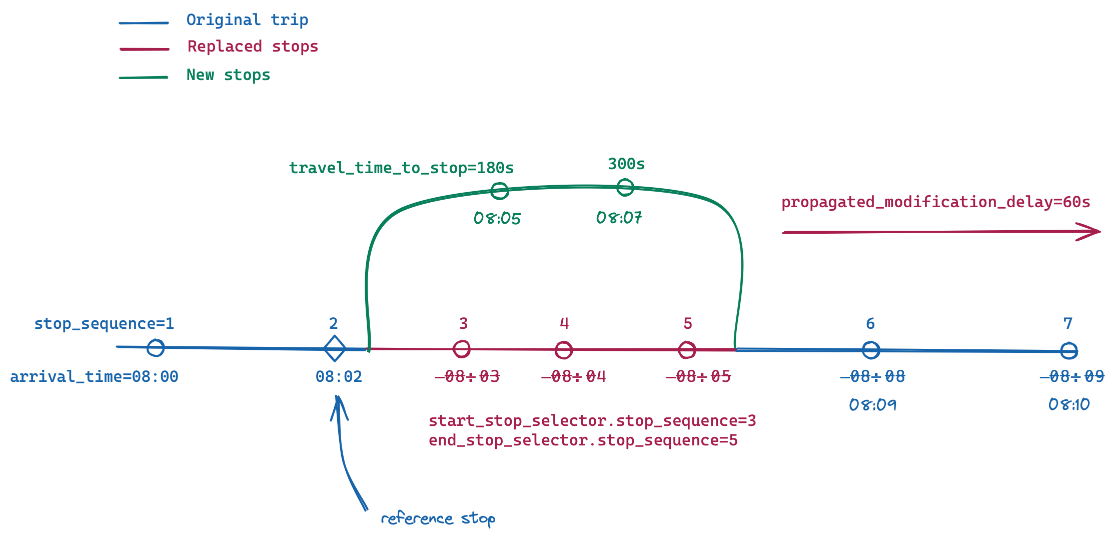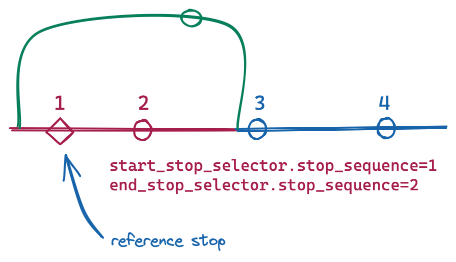Trip Modifications¶
A TripModifications message identifies a list of similar trip_ids from the (CSV) GTFS which are all affected by particular modifications, such as a detour.
Caution: this entity is still experimental, and subject to change. It may be formally adopted in the future.
SLO: Service-level objective¶
The frequency of data updates is expected to be approximately hourly (~24 times/day). Ingestion time may depend on the total number of affected trips. Consumers are expected to ingest a single TripModification within 5 minutes, and a feed with hundreds of detours within 20 minutes.
TripModifications¶
The TripModifications is in effect on all of the listed service_dates, until it is removed from the feed. On any given service date, a trip MUST NOT be assigned to more than one TripModifications object.
There MAY be multiple TripModifications for a given stop pattern. It may be desirable to split the trips into multiple modifications e.g. if the propagated_modification_delay changes significantly, over the course of the detour.
The trips created through GTFS-TripModifications modify and replace each specified trip_id, and don't create a copy or additional run. Modifications are applied on the schedule information, like if a static GTFS (CSV) was modified.
The scheduled stop times of each replacement trip are created from those of the affected trip, by performing the changes listed in modifications. stop_sequence for all stop times are replaced by a new value of 1 to n, starting with 1 on the first stop_time and increasing by 1 for each stop in the trip. A TripUpdate message must be provided to publish real-time arrival/departure times for the replacement trip.
Linkage to TripUpdates¶
- A TripUpdate SHOULD be provided using a
ModifiedTripSelectorinside the TripUpdate'sTripDescriptor.- When the TripUpdate refers to the replacement trip, the consumer should behave as if the static GTFS would have been modified with the TripModifications (e.g.
arrival_time,departure_time,stop_sequence,stop_idon replacement stops). - When providing a
ModifiedTripSelector, thetrip_id,route_id,direction_id,start_time,start_datefields of theTripDescriptorMUST be left empty, to avoid confusion by consumers that aren't looking for theModifiedTripSelectorvalue. - TripUpdate feeds providing updates with
ModifiedTripSelectorSHOULD also include a TripUpdate targeting clients that don't support TripModifications. In other words, there should be two TripUpdates: one for clients with modified trips (withTripModifications) and one for clients with the originial unmodified GTFS (withoutTripModifications). - Providing a TripUpdate with a
ModifiedTripSelectoris the only way to create predictions at replacement stops.
- When the TripUpdate refers to the replacement trip, the consumer should behave as if the static GTFS would have been modified with the TripModifications (e.g.
- If no such TripUpdate is found, TripUpdates for the original
trip_idwill apply to the modified trip.- In this case, the static GTFS information used should be from the static GTFS before any TripModifications applied.
- Real time information can be available to the common stops between the previous trip and the new modified trip; however, no ETA would be available at the replacement stops.
Modification¶
A Modification message describes changes to each affected trip starting at start_stop_selector. There can be zero, one, or more than one stop time(s) replaced by a Modification. The spans of the modifications MUST not overlap. Spans may not be contiguous; in this case the two modifications MUST be merged into one. These stop times are replaced with a new stop time for each replacement stop described by replacement_stops.
The sequence of replacement_stops may be of arbitrary length. For example, 3 stops could be replaced by 2, 4, or 0 stops as the situation may require.

An example showing the effect of a modification on a particular trip. This modification may also be applied to several other trips.

Propagated detour delays affect all stops following the end of a modification. If a trip has multiple modifications, the delays are accumulated.
ReplacementStop¶
Each ReplacementStop message defines a stop that will now be visited by the trip, and optionally specifies the estimated travel time to the stop. The ReplacementStop message is used to construct the scheduled stop_time for the stop.
When travel_time_to_stop is specified, the arrival_time is calculated from a reference stop in the original trip, plus the offset in travel_time_to_stop. Otherwise, the arrival_time can be be interpolated based on the total duration of the modification in the original trip.
The departure_time always equals the arrival_time.
The optional fields of stop_times.txt in the (CSV) GTFS specification are all set to their default values.

If a modification affects the first stop of the trip, that stop also serves as the reference stop of the modification.